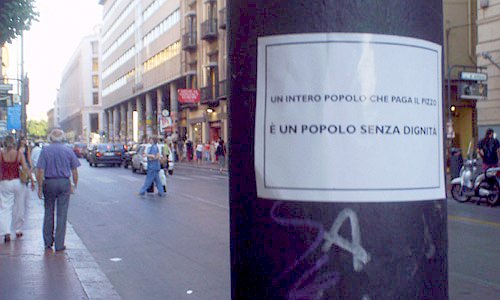So you’re the new state of Israel, it’s , and your citizens are all people who, until recently, were contemptuous of the governments they lived under (whose benefits they were frequently denied, and whose threats they were often first to feel), and who as a result by-and-large considered tax evasion a virtue, not a crime.
Then, in , a candy-maker in Jerusalem commits suicide, blaming it on his tax burden, and in response tax-payer unions across the country launch a tax strike.
What do you do about it?
Turns out that what you do is call in some American experts, experiment with some new methods of intelligence-gathering and record-keeping, and launch a public relations campaign.
In , the American advisers to the Revenue prodded Israeli officials to produce an income tax movie. Initial fears that the movie would become “the subject of ridicule” were overcome. The Government Information Administration commissioned a local studio to produce a 12-minute film, called The Tsippori Affair. This film told the “amusing and enlightening” tale of a tax resister who organizes protests against the income tax only to discover that all government services had been shut down for lack of funding: He visits a hospital and a welfare office and discovers that they are closed because of the non-payment of income taxes. He goes to a primary school and meets children who are sitting outside the front door, playing cards, drinking wine and smoking cigarettes. A small girl puts on lipstick (see fig. 1).

Fig. 1: A Scene from “The Tsippori Affair”: The primary school is closed. A young girl puts on lipstick.
How Israel went from being a state where tax evasion was the norm to one in which tax compliance was common is the case study that Assaf Likhovski uses in his new paper “Training in Citizenship”: Tax Compliance and Modernity.
Likhovski sees the effort to increase tax compliance in Israel as an example of the larger phenomenon — “the desire of modern states to create self-policing, normalized subjects.”
The starting point of my inquiry is one of the first book-length studies of noncompliance — a book entitled Evasion in Taxation, written by Victor Tranter, a University of London economist. Tranter’s book described various methods of evasion… and avoidance… in great detail and suggested different ways of curbing them. Throughout the book, Tranter relied on a criminological distinction between curable and incurable criminals. Using this distinction, Tranter suggested that the state deal with “curable evaders” by appealing to their sense of patriotism, educating them in the basics of “civics,” initiating public relations campaigns, utilizing the services of teachers, accountants and the clergy and declaring tax amnesties.
As for “incurable” tax evaders, Tranter had the following suggestion. “So far,” he said “evasion is not a certifiable form of insanity nor are there yet mental hospitals which admit to their wards for kleptomaniacs those convicted of taxation frauds. We segregate those demonstrably and incurably anti-social in a physical sense, such as confirmed criminals, and those anti-social in a mental sense, such as lunatics and idiots, but not yet those anti-social in an economic sense.” But, he continued “if the test is whether or not the individual has done a serious injury to the community and may possibly do so again in the future, there would appear to be no logical reason why fiscal fraud should be treated exceptionally.” Tranter did not see lunatic asylums as the only answer to the problem of incurable evaders. Another suggestion he made was that “a department should be established to make a scientific investigation of the whole question of evasion.”
At this point, with this linkage of state control and metaphors of disease, you probably smell a Foucault or Szasz reference coming. No disappointment:
Tranter’s interest in using a variety of non-legal techniques and institutions to normalize tax evaders, his desire for “scientific investigation” of the problem and, most of all, his bizarre (but serious) reference to lunatic asylums as a method of tackling evasion, all resonate with a set of critical arguments about the nature of modernity. These arguments, associated mostly with the work of Michel Foucault but also found in the writings of other social theorists, describe the rise of modern states and related nonstate institutions (for example, mental hospitals or schools) not as part of a progressive trajectory of growing individual liberty but instead in terms of growing constraints on the freedom of action of individuals, who become subject to various practices designed to make them self-policing citizens.…

